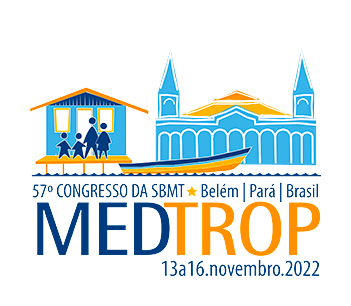Dados do Trabalho
Título
Liver alterations in mice infected gastrointestinal route with a strain of Trypanosoma cruzi IV and treated with benznidazole
Introdução
Chagas disease (CD), caused by the protozoan Trypanosoma cruzi, mainly affects the heart. However, liver damage may also be related to the acute phase of the infection. Currently, the oral route is the most frequent form of transmission of the parasite, which can lead to a more severe infection, affecting the liver in a different way. In addition, benznidazole (BZ), a drug used in the treatment of CD, causes important adverse reactions, with the potential to induce liver toxicity.
Objetivo(s)
The aim of this study was to evaluate the impact of gastrointestinal infection (GI) infection and BZ treatment on histopathological and enzymatic changes in mice inoculated with a T. cruzi IV (TcIV) strain.
Material e Métodos
Swiss mice were inoculated GI and intraperitoneal (IP) routes with 2x106 culture-derived metacyclic trypomastigotes of the BZ-resistant strain AM14 (TcIV) and treated with this drug (BZ 100 mg/kg/day, 20X) from the 5th infection day. A fresh blood test and qPCR were performed to determine the parasite load, in addition to immunosuppression with cyclophosphamide after the etiological treatment. The effects of infection and treatment were evaluated by measuring liver enzymes and histopathological analysis of liver and heart tissues, after staining with hematoxylin-eosin.
Resultados e Conclusão
Infection by the GI route was more virulent, with parasitemia levels up to 2.5 times higher than the animals inoculated by the IP route. In addition, tissue parasitism was found only in the heart tissue of an animal inoculated by the GI route. Intense inflammatory process was observed for both inoculation routes, both in hepatic and cardiac tissue. However, changes in plasma levels of the ALT enzyme were found only in animals infected via the GI route. No significant histopathological differences were observed between the animals in the treated groups and the respective untreated controls of both routes of infection. However, intense inflammatory process was also observed in the BZ-treated and immunosuppressed groups. The AM14 strain when inoculated by the GI route was more virulent to mice than by the IP route. However, intense inflammatory lesions were found in animals inoculated by both routes, even in animals that were treated with BZ. It was also found that the drug alone was capable of causing moderate and intense inflammatory lesions, both in the liver and heart tissue of uninfected animals, suggesting treatment toxicity.
Palavras-chave
Trypanosoma cruzi, oral Chagas disease, benznidazole, aminotransferases.
Área
Eixo 06 | Protozooses
Categoria
NÃO desejo concorrer ao Prêmio Jovem Pesquisador
Autores
Hevillyn Fernanda Lucas da Silva, Marcella Paula Mansano Sarto, Ingrid Giarola Matias dos Santos, Ana Paula de Abreu, Nilma de Souza Fernandes, Aline Francieli da Silva, Alice Maria Souza-Kaneshima, Jurandir Fernando Comar, Max Jean de Ornelas Toledo
